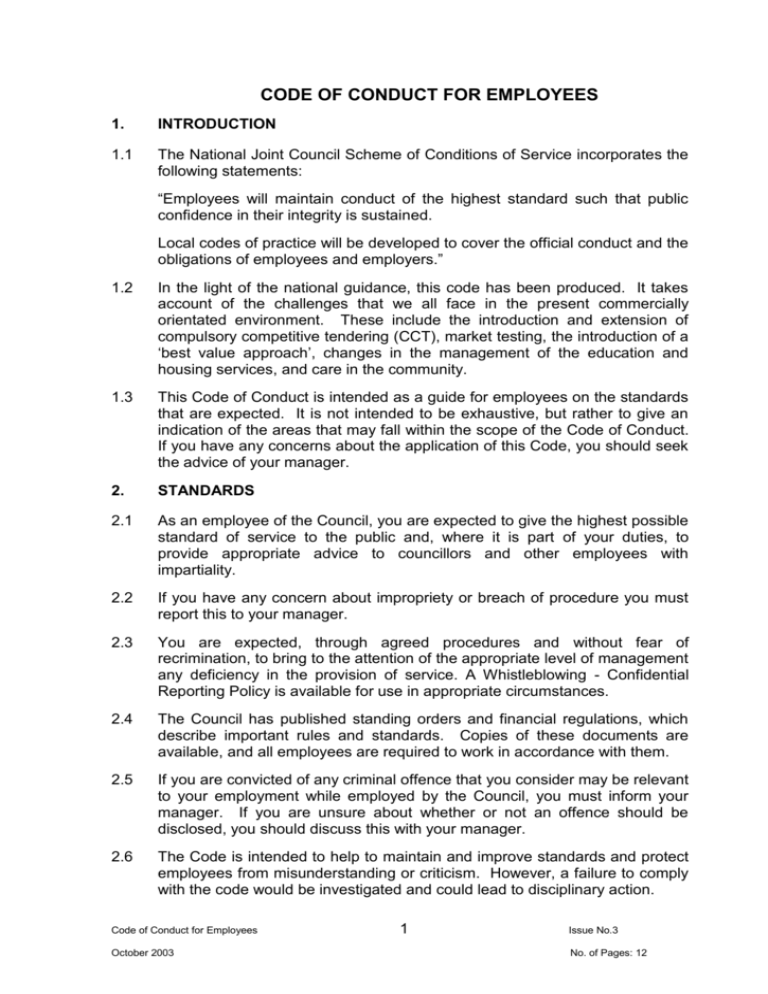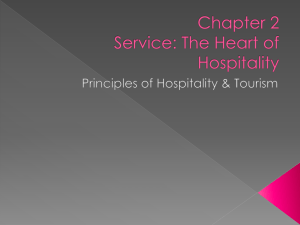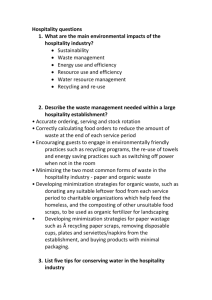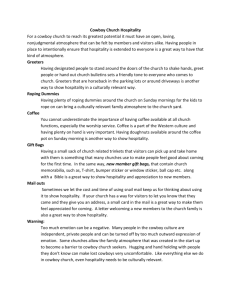CODE OF CONDUCT FOR EMPLOYEES
advertisement

CODE OF CONDUCT FOR EMPLOYEES 1. INTRODUCTION 1.1 The National Joint Council Scheme of Conditions of Service incorporates the following statements: “Employees will maintain conduct of the highest standard such that public confidence in their integrity is sustained. Local codes of practice will be developed to cover the official conduct and the obligations of employees and employers.” 1.2 In the light of the national guidance, this code has been produced. It takes account of the challenges that we all face in the present commercially orientated environment. These include the introduction and extension of compulsory competitive tendering (CCT), market testing, the introduction of a ‘best value approach’, changes in the management of the education and housing services, and care in the community. 1.3 This Code of Conduct is intended as a guide for employees on the standards that are expected. It is not intended to be exhaustive, but rather to give an indication of the areas that may fall within the scope of the Code of Conduct. If you have any concerns about the application of this Code, you should seek the advice of your manager. 2. STANDARDS 2.1 As an employee of the Council, you are expected to give the highest possible standard of service to the public and, where it is part of your duties, to provide appropriate advice to councillors and other employees with impartiality. 2.2 If you have any concern about impropriety or breach of procedure you must report this to your manager. 2.3 You are expected, through agreed procedures and without fear of recrimination, to bring to the attention of the appropriate level of management any deficiency in the provision of service. A Whistleblowing - Confidential Reporting Policy is available for use in appropriate circumstances. 2.4 The Council has published standing orders and financial regulations, which describe important rules and standards. Copies of these documents are available, and all employees are required to work in accordance with them. 2.5 If you are convicted of any criminal offence that you consider may be relevant to your employment while employed by the Council, you must inform your manager. If you are unsure about whether or not an offence should be disclosed, you should discuss this with your manager. 2.6 The Code is intended to help to maintain and improve standards and protect employees from misunderstanding or criticism. However, a failure to comply with the code would be investigated and could lead to disciplinary action. Code of Conduct for Employees October 2003 1 Issue No.3 No. of Pages: 12 2.7 The additional responsibilities of Chief Officers and Heads of Service arising from the Code are attached as Appendix 3. 3. RELATIONSHIPS Councillors 3.1 Employees are responsible to the Council through its senior managers. Your role may require you to give advice to councillors and senior managers. Mutual respect between employees and councillors is essential to good local government. Close personal familiarity between employees and individual councillors can damage the relationship and prove embarrassing to other employees and councillors. It should therefore be avoided. The Local Community and Service Users 3.2 As an employee of the Council, you should always remember your responsibilities to the community you serve and ensure courteous, efficient and impartial service delivery to all groups and individuals within that community as defined by the policies of the Council. Contractors 3.3 Orders and contracts must be awarded on merit, by fair competition between tenders, and no special favour should be shown in the tendering process. Particular care needs to be taken in relation to businesses which the employee is aware are either run by or employ in a senior or relevant management capacity either existing or former employees, friends, partners or relatives. No part of the local community should be discriminated against. 3.4 All relationships of a business or private nature with external contractors, or contractors bidding for contracts, who operate in your area of work, should be reported to your manager for inclusion in the relevant Register of Interests. 3.5 You should declare any private or domestic relationship that you have or have had with contractors who operate in your area or work to your manager for inclusion in the relevant Register of Interests if you engage or supervise contractors or have any other official relationship with contractors. 3.6 If you are involved in the purchase of goods or services from individuals or organisations with whom you come into contact in the course of your private life it would not be appropriate to register every encounter. In such situations you may wish to register a general statement of the type of meeting that may arise during the course of your normal private life. A specific registration would be needed where you, on behalf of the Council, make a decision to enter into a business relationship with a person or an organisation represented by a person with whom you have come into contact in the course of your normal private life. 4. PERSONAL INTERESTS If you have any financial interests that could conflict with the Council’s interests, then you should declare this to your manager for inclusion in the relevant Register of Interests. If you are unclear as to the relevance of a Code of Conduct for Employees Issue No.3 2 4.1 October 2003 No. of Pages: 12 particular matter you should discuss this with your manager. 4.2 If you have any non-financial interests that you consider could bring about conflict with the Council’s interests then you should declare this to your manager for inclusion in the relevant Register of Interests. This might include a relationship with someone seeking planning permission or who is seeking advice under the building control regulations, membership of a school governing body or of the committee of a voluntary organisation, where this is relevant to your area of work. If you are in any doubt about the relevance of a non-financial interest, you should discuss this with your manager. 4.3 If you are a member of any organisation not open to the public without formal membership and commitment of allegiance, which has secrecy about rules or membership or conduct, you should declare this to your manager for inclusion in the relevant Register of Interests 4.4 The Register of Interests Procedure is attached as Appendix 1. 5. CORRUPTION 5.1 It is a serious criminal offence for an employee to seek to influence the placing of a contract by or from the Council through (a) the receiving or giving of any gift, loan, fee, reward or advantage, or (b) by either taking inappropriate action or failing to take action when there is a clear need to do so, or (c) by showing favour, or disfavour, to any person or organisation. 5.2 The Council procedure for recording of hospitality or gifts is set out in Appendix 2. 5.3 You should not take advantage of your position with the Council. This could mean: (a) By acquiring goods or services at a preferential rate which would not normally be available to other Council employees. (b) By acquiring goods or services at a reduced rate because a contractor or those bidding for contracts in your area of work, or another person or body seeking influence with the Council treats you, your relatives or friends more favourably than others. (c) By accepting gifts or hospitality from a contractor or those bidding for contracts with the Council or any other person or body seeking influence with the Council. 5.4 Employees may be offered goods and services at a reduced rate by one of the Council’s suppliers. If this reduced rate is widely publicised as being available to all then the purchase of these items would not generally need to be registered. However, if an employee is in a position to influence the purchasing decisions of the Council in relation to these items, then it would be appropriate for them to discuss the issue with their manager, with a view to registering that interest. Account would need to be taken Code of Conduct for Employees Issue No.3 3 October 2003 No. of Pages: 12 of the level of authority that the individual had in relation to the decision making and the number of checks in place involving other levels of authority. 5.5 A relationship between a supplier of goods and /or services and the Council, should not affect the purchasing practice of an employee in a situation where the prices to the public are published and the employee is purchasing at the published prices. Therefore, an employee would not need to register where they purchase their weekly shopping, for example. 5.6 However, where there is a general expectation that prices are open to negotiation and an employee is responsible for advising on purchasing decisions relating to those items, it would be appropriate for the employee to register. 6. SEPARATION OF ROLES DURING TENDERING 6.1 The law requires the Council to comply with the Compulsory Competitive Tendering (CCT)legislation. Employees involved in the tendering process and dealing with contractors should be clear on the separation of “client” and “contractor” roles within the Council. If you are involved in both client and contractor roles and responsibilities you must be aware of any restrictions that apply to involvement in particular stages in the process. Some of these are set out in relevant government circulars. You should also make declarations of interest at the start of relevant meetings which form part of the tendering process. If you are unclear about the implications in your own case, you should discuss this with your manager. 6.2 If you work in contractor or client units, you must exercise fairness and impartiality when dealing with all customers, suppliers, other contractors and sub-contractors. 7. HOSPITALITY Employees receiving hospitality 7.1 You should only accept offers of hospitality where there is a genuine need to impart information or represent the local Council in the community. Offers to attend purely social or sporting functions should be accepted where the Council wishes to be represented. Offers of hospitality should be authorised by your manager and recorded in the relevant Register of Interests. 7.2 When hospitality has to be declined, those making the offer should be courteously but firmly informed of the procedures and standards operating within the Council. Hospitality that is rejected must be recorded in the relevant Register of Interests. 7.3 When receiving authorised hospitality, you should be particularly sensitive as to its timing in relation to decisions which the Council may be taking affecting those providing the hospitality. 7.4 Acceptance of hospitality through attendance at relevant conferences and courses is acceptable where it is clear the hospitality is corporate rather than personal, offered to the Council rather than the individual employee on a personal basis. In such cases, you should obtain the consent, in advance, of Code of Conduct for Employees Issue No.3 4 October 2003 No. of Pages: 12 your manager and it should be recorded in the Register of Interests. 7.5 Where visits to inspect equipment etc. are required, you should ensure that the Council meets the cost of such visits to avoid jeopardising the integrity of subsequent purchasing decisions Employees providing hospitality 7.6 Where you have to offer hospitality to visitors to Council premises, meals should normally be taken in the dining room (or other appropriate venue), and it is a matter for individual judgement whether only the visitors meal is reimbursed, or whether both staff and visitors meals are reimbursed. 7.7 Only in special circumstances should meals be provided away from Council premises and the reason for this should be stated on the reclaim voucher. Prior authorisation from your manager will be necessary. Heads of Service need permission from their Strategic Director; Strategic Directors from the Chief Executive. 8. GIFTS 8.1 As a general rule you should not accept significant personal gifts from clients, contractors and outside suppliers. Gifts, such as wines or spirits, which are given to individuals must not be accepted. However, the Council allows employees to keep insignificant items of token value such as pens, diaries etc. 8.2 Council employees may not accept personal payments from clients, contractors or outside suppliers. 9. SPONSORSHIP - GIVING AND RECEIVING 9.1 Where an outside organisation wishes to sponsor or is seeking to sponsor a local Council activity, whether by invitation, tender, negotiation or voluntarily, the basic conventions concerning acceptance of gifts or hospitality apply. Particular care must be taken when dealing with contractors or potential contractors. 9.2 Where the Council wishes to sponsor an event or service and you are involved in some way in consideration of the application, neither you nor your partner, spouse or relative must benefit from such sponsorship without there being full disclosure to the manager for inclusion in the Register of Interests. Similarly, where the Council through sponsorship, grant aid, financial or other means, gives support in the community, employees should ensure that impartial advice is given and that there is no conflict of interest involved. 9.3 An employee is not normally expected to register that they undertake voluntary work in an organisation that is in receipt of a grant from the Council. However, if in the course of their employment they were involved in the processing of the application or advising officers or members of the Council on the application they would need to register the potential conflict of interest. Code of Conduct for Employees October 2003 5 Issue No.3 No. of Pages: 12 10. DISCLOSURE OF INFORMATION 10.1 There is a statutory responsibility that requires certain types of information to be made available to Members, auditors, government departments, service users and the public. The Council itself may decide to be open about other types of information. You must be aware of the information you may be open about, and act accordingly. 10.2 You should not use any information obtained in the course of your employment for personal gain or benefit, nor should you pass it on to others who might use it in such a way. 10.3 You should be aware that the Council’s standing orders limit communication with the news media. Only members of the Chief Officer Board and the Head of Press and Public Relations may give information to the Press about any aspect of the Council’s business, unless specific items have been delegated to other Officers. However, the Council recognises the right of Union Officials to speak to the Press on matters directly affecting their members. 10.4 Making unauthorised or improper use of confidential information is a serious offence, which the Council may regard as gross misconduct, and which may place your job in jeopardy. Detailed guidance is available for employees working in some departments. You will be provided with copies of any guidance that relates to your department. 10.5 If you are privy to confidential information on tenders or costs for either internal or external contractors, you should not disclose that information to any unauthorised party or organisation, including any other potential bidder whether internal or external. 11. POLITICAL NEUTRALITY 11.1 All employees serve the Council as a whole. It follows that you must serve all councillors and not just those of the controlling group, and must ensure that the individual rights of all councillors are respected. 11.2 Councillors usually direct enquiries for information through Strategic Directors or Heads of Service. However, if you receive a direct approach from a Councillor for information and you are doubtful about whether it is appropriate to provide the information or about the organisation’s ability to supply the information, advise the Councillor accordingly. Explain that you will refer the matter to your manager to establish what can be done to assist. 11.3 Subject to the Council’s conventions, you may also be required to advise political groups. If asked to do so, this should be agreed with your Strategic Director. You should also ensure that another officer is present at the meeting with you. 11.4 Whether or not you are in a politically restricted post, you must follow every lawful expressed policy of the Council and must not allow your own personal or political opinions to interfere with your work. Code of Conduct for Employees October 2003 6 Issue No.3 No. of Pages: 12 12. EQUALITY ISSUES 12.1 All employees contribute to ensuring that policies relating to equalities issues as agreed by the Council in addition to the requirements of the law are complied with. All members of the local community, customers, Councillors and other employees have a right to be treated with fairness and equity. 13. APPOINTMENTS AND OTHER EMPLOYMENT MATTERS 13.1 Employees involved in appointments should ensure that these are made on the basis of merit and in accordance with the Council’s Recruitment and Selection Procedures. It would be unlawful for an appointment to be made on the basis of anything other than the ability of the candidate to undertake the duties of the post. 13.2 In order to avoid any possible accusation of bias, you should not be involved in an appointment where you are related to an applicant, or you have a personal relationship outside work with him or her. 13.3 Similarly, you should not be involved in decisions relating to discipline, promotion or pay adjustments for any employee who is a relative, partner or a personal friend. 14. OUTSIDE COMMITMENTS 14.1 You should be clear about your contractual obligations and should not take outside employment that conflicts with the Council’s interests. Employees on grade MK9, or equivalent and above, have to obtain written consent to take any outside employment. 14.2 The Council is entitled to ownership of intellectual property or the copyright of material created by you in the course of your duties as an employee of the Council. 15. USE OF FINANCIAL RESOURCES 15.1 You must ensure that you use any public funds entrusted to you in a responsible and lawful manner. You should strive to ensure value for money to the local community and to avoid legal challenge to the Council. 16. REVIEW 16.1 This Code will be kept under review and any amendments will be subject to consultation with staff representatives. The Code will be subject to formal review in December 2002. Code of Conduct for Employees October 2003 7 Issue No.3 No. of Pages: 12 REGISTER OF INTERESTS PROCEDURE 17. PURPOSE: 17.1 This procedure, which is referred to in the Council’s Code of Conduct, sets out the arrangements which the Council has in place for the maintenance of registers of interests for all its staff. In considering what it is appropriate to register individual employees may need to include the interests of family and friends, where these have an impact on, or could be interpreted as influencing the employee’s conduct in relation to the performance of their duties. 18. GENERAL PRINCIPLES: 18.1 Each Strategic Director is charged with the responsibility for making arrangements within their Directorate for one or more registers of interests to be kept. In making these arrangements Strategic Directors will need to take account of the size of the Directorate and the number of different workplaces. 18.2 Employees will be invited annually to complete a form, Annex A, and return this for retention on the appropriate register of interests. Employees may provide a “nil return” if they have no interests that they wish to register. However, if forms are not completed by the deadline provided by the Strategic Director, it will be assumed that the employee is not prepared to provide the information and this will be recorded in the Register. 18.3 New employees will be invited to complete a form during their induction period. 18.4 Employees may update the appropriate register of interests at any time. 18.5 As employees report interests, the forms shall be reviewed by the Strategic Director, before being filed securely. 18.6 The Strategic Director will discuss any potential conflict of interest with the individual employee concerned and, in appropriate circumstances with the relevant Head of Section. 18.7 The registers of interests shall be kept in a locked cupboard, and shall not be recorded on any computer system. 19. MAINTAINING THE REGISTER 19.1 The Strategic Director will be responsible for writing to all staff annually to remind them of their opportunity to register any interests which they wish to record on the Directorate Register of Interests. Staff must register that they do not have any interests to record. 19.2 The information that employees will be invited to register will include: (a) Commercial Interests, such as paid work, home businesses, contracts with builders. (b) Relationships with those seeking planning permission or advice, and community interests, such as membership of school governing Code of Conduct for Employees Issue No.3 8 October 2003 No. of Pages: 12 bodies, or the committees of voluntary organisations. This list is indicative, not exhaustive. If you are unclear whether you may have an interest that you should declare, this should be discussed with your manager. 19.3 The Strategic Director will ensure that staff in his/her Directorate are aware of the local arrangements for registering interests and offers of hospitality and/or gifts. Code of Conduct for Employees October 2003 9 Issue No.3 No. of Pages: 12 DECLARATION OF INTERESTS OUTSIDE WORK Code of Conduct for Employees October 2003 10 Issue No.3 No. of Pages: 12 Name: _______________________________________________________________ Directorate: ________________________ Service: _________________________ In considering what it is appropriate to register you may need to include the interests of family and friends, where these have an impact on, or could be interpreted as influencing your conduct in relation to the performance of your duties. *Please delete where appropriate 1. Financial Interests * Yes / No If ‘Yes’, please indicate below the nature of the interest to be registered. 2. Non Financial Interests (e.g. planning enquiries, school governor, committee member, etc) * Yes / No If ‘Yes’, please indicate below the nature of the interest to be registered. 3. Membership of organisations specified under 3.3 of the Code of Conduct: * Yes / No If ‘Yes’, please indicate below the nature of the interest to be registered. I confirm that I have the interests listed above which could conflict with my duties at MKC. Signed: ____________________________ Code of Conduct for Employees October 2003 11 Date: __________________ Issue No.3 No. of Pages: 12 APPENDIX 2 REGISTRATION OF HOSPITALITY AND GIFTS PROCEDURE 20. INTRODUCTION: 20.1 This procedure, which is referred to in the Council’s Code of Conduct, sets out the arrangements which the Council has in place for the maintenance of registers of hospitality and gifts offered to employees of the Council. Employees are expected to register all offers that are received, whether or not they are accepted. 20.2 Offers of hospitality and/or gifts must be registered as they are received. It is not appropriate for these to be done on an annual basis. 21. HOSPITALITY Employees receiving hospitality 21.1 You should only accept offers of hospitality where there is a genuine need to impart information or represent the local Council in the community. Offers to attend purely social or sporting functions should be accepted where the Council wishes to be represented. Offers of hospitality should be authorised by your manager and recorded in the relevant Register of Interests. 21.2 When hospitality has to be declined, those making the offer should be courteously but firmly informed of the procedures and standards operating within the Council. Hospitality that is rejected must be recorded in the relevant Register of Interests. 21.3 When receiving authorised hospitality, you should be particularly sensitive as to its timing in relation to decisions which the Council may be taking affecting those providing the hospitality. 21.4 Acceptance of hospitality through attendance at relevant conferences and courses is acceptable where it is clear the hospitality is corporate rather than personal, offered to the Council rather than the individual employee on a personal basis. In such cases, you should obtain the consent, in advance, of your manager and it should be recorded in the Register of Interests. 21.5 Where visits to inspect equipment etc. are required, you should ensure that the Council meets the cost of such visits to avoid jeopardising the integrity of subsequent purchasing decisions Employees providing hospitality 21.6 Where you have to offer hospitality to visitors to Council premises, meals should normally be taken in the dining room (or other appropriate venue), and it is a matter for individual judgement whether only the visitors meal is reimbursed, or whether both staff and visitors meals are reimbursed. Code of Conduct for Employees October 2003 12 Issue No.3 No. of Pages: 12 21.7 Only in special circumstances should meals be provided away from Council premises and the reason for this should be stated on the reclaim voucher. Prior authorisation from your manager will be necessary. Heads of Service need permission from their Strategic Director; Strategic Directors from the Chief Executive. 22. GIFTS 22.1 As a general rule you should not accept significant personal gifts from clients, contractors and outside suppliers. Gifts, such as wines or spirits, which are given to individuals must not be accepted. However, the Council allows employees to keep insignificant items of token value such as pens, diaries etc. 22.2 Council employees may not accept personal payments from clients, contractors or outside suppliers. 23. MAINTAINING THE REGISTER 23.1 The Strategic Director will maintain a record of offers of hospitality and/or gifts and to ensure that staff in his/her Directorate is aware of these arrangements. Code of Conduct for Employees October 2003 13 Issue No.3 No. of Pages: 12 DECLARATION OF HOSPITALITY OR GIFT Name: _________________________ Division: _________________________ OFFER OF HOSPITALITY OR GIFT Offered by: Nature of hospitality/gift: Date: Action Taken: Accepted: Yes/No* * Please delete as appropriate. I confirm the above details are an accurate record of the offer of hospitality/gift. Signed: Date: Manager’s comments: Signed: Date: Name: Position: Code of Conduct for Employees October 2003 14 Issue No.3 No. of Pages: 12 APPENDIX 3 THE RESPONSIBILITIES OF CHIEF OFFICERS AND HEADS OF SERVICE ARISING FROM MILTON KEYNES COUNCIL’S CODE OF CONDUCT FOR EMPLOYEES: 1. The council, through its employees, is accountable to the public it serves. As a Chief Officer or Head of Service you have a particular responsibility in representing the council to the public. Your behaviour must, at all times, inspire public confidence in your actions and your integrity. The Council expects you to be able to demonstrate the highest standards of probity, integrity and propriety in all your dealings. 2. To assist you in this, the Council has introduced a revised Code of conduct that sets out the standards of behaviour expected of all its employees. In particular, it confers some direct, personal responsibilities upon senior managers. 2.1 As a Chief Officer or a Head of Service you are a custodian of the Code. You are expected to behave in a manner that is consistent with both the word and the spirit of the Code. The trust that is implicit in the Code lies at the heart of your contract of employment. 2.2 Your own conduct should demonstrate a positive commitment to the Code. This will serve as an example to the employees under your control and will reinforce the standards of conduct that the Code seeks to establish. 2.3 As a Chief Officer or Head of Service, you have a direct, personal responsibility to ensure that the employees under your control understand and meet the requirements of the Council’s Code of Conduct. Any failure by any employee to meet the standards expected by the Code will be investigated, and in appropriate cases could lead to disciplinary action being taken against them. Code of Conduct for Employees October 2003 15 Issue No.3 No. of Pages: 12







